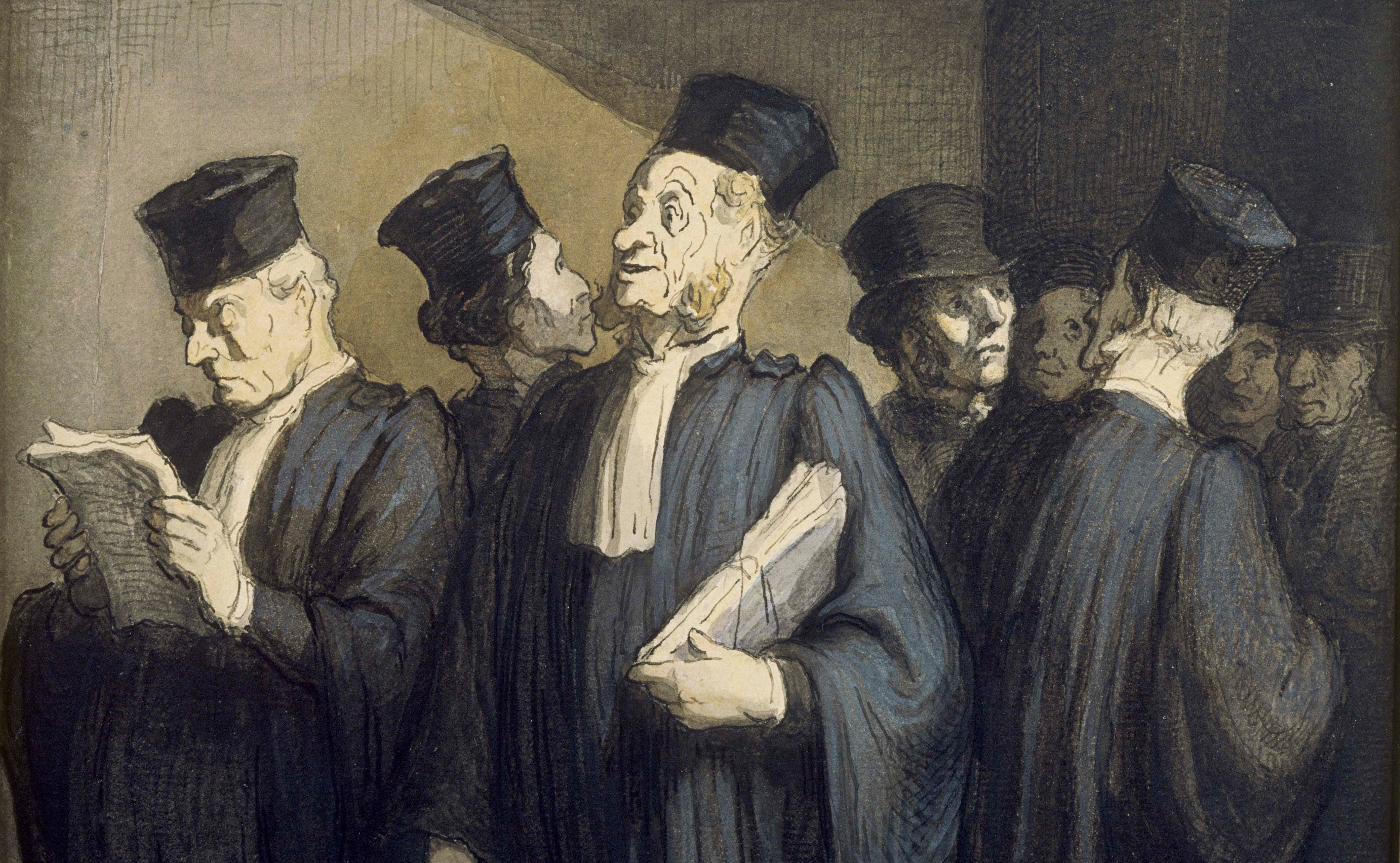
Before the Hearing, Honoré Daumier, ca. 1860s
The idea of law and the ideal of the rule of law are central to the Western tradition of thought about public (or political) order.1 St. Thomas Aquinas went so far as to declare that “it belongs to the very notion of a people (ad rationem populi) that the people’s dealings with each other be regulated by just precepts of law.”2 In our own time, Pope John Paul II forcefully reaffirmed the status of the rule of law as a requirement of fundamental political justice.3 For all the romantic appeal of “palm tree justice” or “Solomonic judging,” and despite the sometimes decidedly unromantic qualities of living by preordained legal rules, the Western tradition affirms that justice itself requires that people be governed in accordance with the principles of legality.
Among the core concerns of legal philosophers since the middle of the last century have been the meaning, content, and moral significance of the rule of law. The renewal of interest in this very ancient question (or set of questions) has had to do above all, I think, with the unprecedented rise and fall of totalitarian regimes. In the aftermath of the defeat of Nazism, legal philosophers of every religious persuasion tested their legal theories by asking, for example, whether the Nazi regime constituted a legal system in any meaningful sense. In the wake of communism’s collapse in Europe, legal scholars and others tried to understand the role of legal procedures and institutions in creating and sustaining decent democratic regimes. It was in this context that Pope John Paul II had occasion to stress the moral importance of the rule of law.
One of the signal achievements of legal philosophy in the twentieth century was Lon L. Fuller’s explication of the content of the rule of law.4 Reflecting on law as a “purposive” enterprise—the subjecting of human behavior to the governance of rules—Fuller identified eight constitutive elements of legality. These are (1) the prospectivity (i.e., non-retroactivity) of legal rules, (2) the absence of impediments to compliance with the rules by those subject to them, (3) the promulgation of the rules, (4) their clarity, (5) their coherence with one another, (6) their constancy over time, (7) their generality of application, and (8) the congruence between official action and declared rule. Irrespective of whether a legal system (or a body of law) is good or bad—that is to say, substantively just or unjust—to the extent that it truly is a legal system (or a body of law), it will to some significant degree exemplify these elements.
It was a mark of Fuller’s sophistication, I think, that he noticed that the rule of law is a matter of degree. Its constitutive elements are exemplified to a greater or lesser extent by actual legal systems or bodies of law. Legal systems exemplify the rule of law to the extent that the rules constituting them are prospective, susceptible of being complied with, promulgated, clear, and so forth.
Even Fuller’s critics recognized his achievement in explicating the content of the rule of law. What they objected to was Fuller’s claims—or, in any event, what they took to be Fuller’s claims—on its behalf. Provocatively, Fuller asserted that, taken together, the elements of the rule of law, though in themselves procedural, nevertheless constitute what he called an “internal morality of law.” (Hence the title of Fuller’s major work on the subject of the rule of law: The Morality of Law.) Moreover, he explicitly presented his account of the rule of law as a challenge to the dominant “legal positivism” of his time. According to Fuller, once we recognize that law, precisely as such, has an internal morality, it becomes clear that the “conceptual separation of law and morality”—which forms the core of the “positivist” understanding of law, legal obligation, and the practical functioning of legal institutions—cannot be maintained.
These claims drew sharp criticism from, among others, Herbert Hart, the Oxford legal philosopher whose magisterial 1961 book The Concept of Law5 both substantially revised and dramatically revitalized the positivist tradition in analytical jurisprudence. In a now famous review essay in the Harvard Law Review, Hart accused Fuller of, in effect, engaging in a semantic sleight of hand.6 According to Hart, there is not the slightest reason to suppose that the constitutive elements of legality, which Fuller correctly and very usefully identified, should be accounted as a morality of any sort. As Fuller himself seemed to concede, unjust (or otherwise morally bad) law can exemplify the procedural elements of legality just as fully as just law can. But if that is true, then it is worse than merely tendentious to claim that these elements constitute an “internal morality of law.”